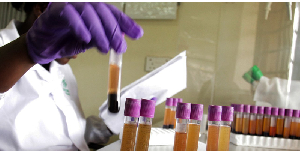Business News of Monday, 24 April 2017
Source: B&FTonline
EIU backs government’s growth and deficit targets
UK-based research firm Economist Intelligence Unit (EIU) is backing government to achieve its economic growth target of 6.3 percent, as well as cut its deficit to 6.5 percent, as announced in the 2017 budget statement.
The new government hopes to almost double last year’s growth figure of 3.9 percent, and also reduce from about 9 percent to about 6.5 percent.
Following a raft of tax cuts, concerns have been raised as to whether government can achieve these targets, particularly the budget deficit which, last year, was 3 to 4 percent higher than budgeted.
But in its country report, dated March 2017, the Economist Intelligence Unit, argues that the country’s real GDP growth prospects, boosted by the onset of new oil and gas production, for this year, are favourable.
The first oil from the Tweneboah-Enyerra-Ntomme (TEN) project came on stream in August last year, but the main impact, the EIU said, will be felt as production heads towards capacity in 2017. Oil and gas output from the Sankofa-Gye Nyame project will also commence during 2017/18.
In addition to new petroleum output, production from the country’s first oilfield, Jubilee, is further expected to pick up from next year after a series of technical problems in 2016 and development work planned for this year.
'After a hydrocarbons-related spike in real GDP growth to an average of 6.7 percent in 2017-18, growth will ease back to a robust, but not spectacular, 5.2 percent in 2020 as Ghana is affected by weaker global economic conditions and election-related uncertainty. Growth of 5.5 percent is then forecast in 2021 as local and global confidence improves,' the report said.
The report also forecasts that improvement made in electricity generation will support growth throughout the forecast period as the new government continues the work of its predecessor in getting to grips with boosting supply after years of severe shortages.
According to the EIU forecast, the overall fiscal deficit is expected to come down from the 9 percent of GDP estimated for 2016 to 6.5 percent of GDP in 2017, just as the government had targeted in the budget.
'Stronger economic growth and further expansion in oil and gas revenue, coupled with modest spending restraint, will help the deficit to come down to 4.3 percent of GDP in 2019. We forecast an election-related increase to 4.9 percent of GDP in 2020. A return to fiscal consolidation will then be on the agenda in 2021, with the deficit back down to 3.8 percent of GDP,' the report said.
Nevertheless, the EIU maintains that this year’s deficit target is still well above the initial IMF bailout programme target for 2017 of 3.7 percent of GDP. But it expects the IMF to tolerate this so long as some efforts towards consolidation are made.
But with the Akufo-Addo-led government planning a more sustainable debt strategy, the EIU forecasts that the rate of decline in the fiscal deficit will not be enough to make much of a dent in the public debt burden, which will remain above 70% of GDP throughout 2017-21.
'Longer-term debt sustainability will require a sustained period of fiscal responsibility and continued robust levels of economic growth,' the EIU said.











